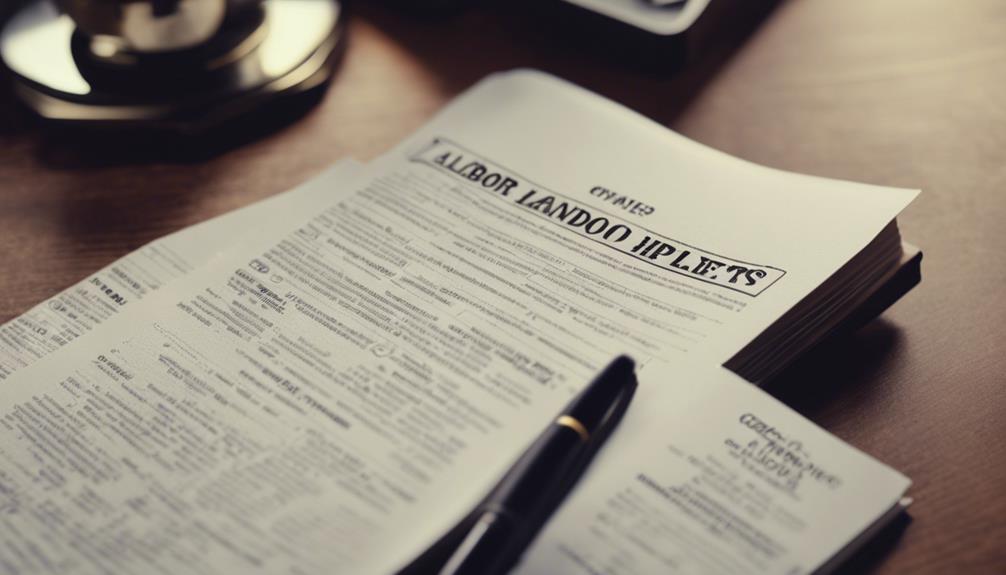When it comes to navigating the intricate web of US labor laws, it's like walking a tightrope in a legal circus. To ensure your business stays on the right side of the law, mastering essential compliance tips is crucial.
From understanding discrimination laws to utilizing cloud-based HR solutions, each step plays a pivotal role in safeguarding your employees' rights and your business's integrity.
So, are you ready to elevate your compliance game and secure a solid foundation for your organization's future success?
Key Takeaways
- Regular policy reviews and legal guidance ensure compliance with US labor laws.
- Job application forms must include required fields and equal opportunity statements.
- Pre-employment checks, including background checks, are essential for verifying qualifications.
- Accurate record-keeping and employee handbook updates maintain compliance and legal protection.
Understanding US Labor Laws
Understanding US labor laws is essential for businesses to navigate the intricate regulations that govern the employer-employee relationship effectively. Compliance with labor laws isn't just a legal requirement; it's a crucial step in ensuring that your employees are treated fairly and that your workplace remains harmonious. By familiarizing yourself with employment laws, you can protect your employees' rights, avoid legal pitfalls, and maintain a positive working environment.
Employment laws cover a wide range of areas, including minimum wage, overtime pay, workplace safety, discrimination, and leave policies. Staying informed about these regulations is vital to ensure compliance with labor laws and prevent any issues that may arise from misunderstandings or negligence. Regularly reviewing and updating your policies in line with the latest labor laws can help you uphold fair practices and demonstrate your commitment to providing a safe and equitable workplace for your employees. Remember, seeking legal guidance when needed can further support your efforts in navigating the complexities of US labor regulations.
Importance of I-9 Forms

Ensuring proper completion of Form I-9 is a critical step in verifying your employees' eligibility for US employment and maintaining compliance with labor regulations. The I-9 form serves as a crucial document in demonstrating that your employees are authorized to work in the United States.
Filing the Form I-9 within three days of an employee's start date isn't just a formality but a legal requirement that must be met to ensure labor law compliance. Accuracy is key when completing the form, including providing the correct dates, signatures, and supporting documents.
Job Application Forms Compliance
When creating job application forms, ensure you include all required fields and equal opportunity statements to comply with labor laws. By following these guidelines, you demonstrate your commitment to fair hiring practices and avoid potential legal issues.
Stay informed on the necessary components to maintain compliance and protect your organization.
Required Fields on Forms
To ensure full compliance with US labor laws, be sure to include all required fields on job application forms, covering essential personal and professional details. Employment seekers must provide personal information like name, address, and contact details. Work history, including previous employers and job titles, is typically mandatory. Educational background, such as degrees obtained and schools attended, is also crucial information to include.
Some forms may ask applicants to disclose any criminal history or convictions. Contact details for references or emergency contacts are commonly required as well. By ensuring that all these necessary fields are included on your job application forms, you can maintain compliance with labor laws and streamline the hiring process efficiently.
Equal Opportunity Statements
Make certain your job application forms comply with Equal Opportunity regulations by prominently featuring the necessary Equal Opportunity Statements to uphold fair employment practices. These statements are crucial to prevent discrimination in the hiring process, ensuring compliance with labor law and demonstrating a commitment to diversity and inclusion. Failing to include these statements can result in legal consequences and penalties. To help you understand better, here is an example of how the Equal Opportunity Statements section could be structured on a job application form:
| Equal Opportunity Statements |
|---|
| We are an equal opportunity employer and do not discriminate based on race, color, religion, sex, age, or disability. |
| Our hiring decisions are made solely on qualifications, merit, and business needs. |
| If you require accommodations during the application process, please contact us. |
| We are committed to fostering an inclusive environment for all employees. |
Pre-Employment Checks Best Practices

When conducting pre-employment checks, it's crucial to emphasize the importance of background checks, ensuring legal compliance with regulations such as the Fair Credit Reporting Act (FCRA).
By obtaining applicant consent and informing them about the process, you not only uphold their rights but also establish a transparent and compliant screening procedure.
Staying informed about federal and state laws is key to mitigating risks of penalties and liabilities associated with non-compliance.
Background Check Importance
Conducting pre-employment background checks is an essential practice for verifying applicant qualifications and ensuring workplace safety. When it comes to background checks, compliance with the Fair Credit Reporting Act (FCRA) is crucial. Here are some best practices to consider:
- Perform financial, employment, criminal, and commercial record checks.
- Inform applicants about the background check process and obtain their consent.
- Follow proper procedures to ensure compliance with FCRA regulations.
- Include background checks as an integral part of your hiring process.
Legal Compliance Requirements
To ensure legal compliance in pre-employment checks, it's imperative to review financial, employment, criminal, and commercial records thoroughly. Make sure to obtain applicant consent and inform them about background checks during the hiring process.
Stay compliant with labor laws by following Fair Credit Reporting Act (FCRA) standards for pre-employment screening. Align your job application questions with legal requirements regarding criminal background checks. Keep yourself updated on federal and state laws related to pre-employment checks to avoid penalties for non-compliance.
Applicant Rights Awareness
Enhance your hiring process by prioritizing applicant rights awareness in pre-employment checks to ensure compliance with legal regulations and foster transparency. When conducting background checks, remember to follow FCRA compliance standards and respect applicant rights throughout the pre-employment process.
Here are some best practices to consider:
- Inform applicants of background checks and obtain their consent following FCRA guidelines.
- Review various records such as financial, employment, criminal, and commercial backgrounds with adherence to pre-employment check procedures.
- Include important notices about at-will employment, ADA procedures, and criminal-background inquiries in the job application form for transparency.
- Ensure that background checks are conducted in a manner that respects applicant rights and maintains compliance with legal requirements.
- Integrate background checks seamlessly into the pre-employment process to uphold transparency and legality.
Cloud-Based HR Solutions for Compliance

Streamlining compliance with various labor laws and regulations is made efficient through the utilization of cloud-based HR solutions. Inflection HR, spearheaded by experts like Jen Leigh, offers cutting-edge technology to assist in maintaining compliance effortlessly. By leveraging cloud-based HR solutions, companies can easily stay updated on changing statutes and laws, ensuring adherence at all times. One key advantage of these solutions is the ability to integrate compliance checks seamlessly into the job application process, guaranteeing that employers meet all necessary requirements.
| Benefits of Cloud-Based HR Solutions for Compliance |
|---|
| 1. Simplifies compliance with labor laws and regulations |
| 2. Provides real-time updates on changing statutes |
| 3. Integrates compliance checks into job application process |
| 4. Ensures adherence to legal requirements effortlessly |
| 5. Expert guidance from leaders like Jen Leigh at Inflection HR |
Embracing cloud-based HR solutions like Inflection HR can empower your organization to navigate the complex landscape of labor law compliance efficiently. With these innovative tools, you can enhance your compliance processes and stay ahead of regulatory changes seamlessly.
Record-Keeping for Compliance

Implementing meticulous record-keeping practices is vital for ensuring compliance with various labor laws and regulations, safeguarding your organization from potential legal risks and financial penalties.
To effectively manage record-keeping for compliance, consider the following key aspects:
- Wage Compliance: Accurate records are essential for ensuring proper payment to employees and adhering to the most stringent minimum wage laws across different states.
- Employee Leave: Detailed records play a crucial role in tracking and managing employee leave for compliance with the Family and Medical Leave Act (FMLA) and sick leave regulations.
- Healthcare Eligibility: Maintaining precise records of employee hours is vital for demonstrating compliance with healthcare eligibility requirements under the Affordable Care Act (ACA).
- Demonstrating Compliance: Thorough record-keeping practices are necessary to showcase adherence to labor laws and avoid costly consequences.
- Legal Protection: Effective record-keeping not only aids in compliance but also provides legal protection in case of audits or disputes.
Recruitment Process Legality

Maintaining legal compliance throughout the recruitment process is crucial to mitigate potential risks and ensure fair and ethical hiring practices. Adhering to discrimination laws is paramount during steps like screening and interviews to avoid legal issues.
It's essential to create and uphold official employment contracts to provide clarity and protection for both parties involved. Discrimination based on protected characteristics such as race, gender, age, or disability must be strictly avoided throughout the hiring process.
Safeguarding candidate information in line with privacy laws is vital to ensure the protection of individuals' data during recruitment. Utilizing online templates for legal documents can help guarantee compliance with labor laws and regulations in recruitment practices.
Employee Handbook Necessity

Ensuring your organization has a comprehensive employee handbook is crucial for establishing clear communication of rights, responsibilities, and company policies to staff members. Here are some reasons why an employee handbook is a necessity for your business:
- Informing Staff: An employee handbook educates employees about their rights, duties, and the organization's policies.
- Supporting Management Decisions: It provides guidelines for management decisions, such as terminations based on policy violations.
- Compliance and Updates: Regular updates to the handbook ensure alignment with company goals and compliance with changing labor laws and regulations.
- Employee Acknowledgment: Acknowledgment of receipt of the handbook by employees is vital to demonstrate they're informed.
- Prevention and Consistency: An up-to-date handbook helps prevent wrongful termination cases and ensures consistency in employee expectations.
Having a well-maintained employee handbook not only fosters compliance but also creates a transparent and harmonious work environment.
Conclusion
In conclusion, ensuring compliance with US labor laws is crucial for both employees and businesses. Did you know that in 2020, the Department of Labor collected over $322 million in back wages for workers through enforcement efforts?
By following essential tips such as accurate record-keeping, pre-employment checks, and using cloud-based HR solutions, you can protect your business and uphold the rights of your employees. Stay informed and proactive to avoid costly consequences and maintain a reputable operation.